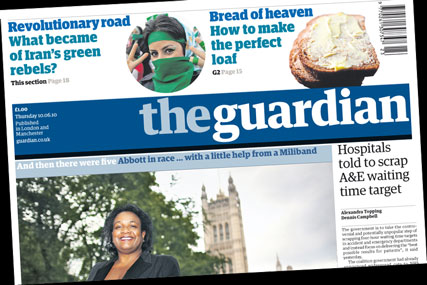
Today's announcement follows a year of double-digit falls in newspaper advertising spend and £96.5m impairments of GMG's investment in Emap and £63.9m for GMG Radio.
A further loss of £47m following the group's sale of its regional media division is not included in the pre-tax losses.
Carolyn McCall, chief executive of GMG, noted the recession had "driven steep declines in advertising revenues" across the media industry, and admitted it has been "a real test for all our businesses".
Today’s record loss for 2009/10 follows a pre-tax loss of £96.7m in the previous financial year.
McCall, who is due to leave the publishing group after 24 years this summer, warned last month that losses had significantly increased because of write-downs on its investments.
Apax and GMG bought Emap, which has been valued at about £1.1bn, in March 2008 but the value of the original equity investment was written down to zero by Apax a year later, following the recession, and GMG have written down its original euity investment of £300m by £96.5m.
Turnover, not including the Trader Media Group and Emap joint ventures, fell by £31m to £280m. Yet a series of cost-cutting initiatives, including the loss on 203 posts, did result in GMG’s operating loss before exceptional items actually falling, from £65.2m to £53.9m year on year.
A GMG spokesman today admitted: "Clearly this wouldn't be acceptable in a publicly-listed company but we [at GMG] are far less concerned about short-term P&L, because our focus is on the long-term capital value of the Group and its portfolio of investments, which remains very strong."
However, Amelia Fawcett, chair of GMG, insisted GMG remains well positioned in terms of overall resources and financial health.
"The pre-tax loss was driven primarily by non-cash adjustments relating to asset impairments, not cash outflow, she said. During 2009/10, despite economic turmoil and continued upheaval in the creative industries, GMG’s combined cash balance and investment fund declined by less than 3%."
GMG has sought to reduce its risk by diversifying the group’s portfolio, and to exchange short-term profit for financial security through investments which position the group for future growth, but do not necessarily bring an immediate return.
The outsourcing of GMG’s non-core operations also provided some commercial relief throughout the year.
GNM, the division which houses The Guardian and The Observer, saw revenues fall £32.6m while its operating loss remained on a par with the previous year at £34.4m.
GMG's cash and investment fund fell slightly from £267.7m to £260.8m.
Fawcett added: "Due to the long-term approach taken by the group and its sole shareholder, the value of our portfolio of assets and investments, and improving economic conditions, there is every reason to be confident about the future of GMG and, most importantly, its ongoing ability to support the Guardian’s journalism."
GMG is wholly owned by the Scott Trust and its multimedia portfolio includes national newspapers, radio stations, magazines, websites and B2B media.





.jpg)
.jpeg)